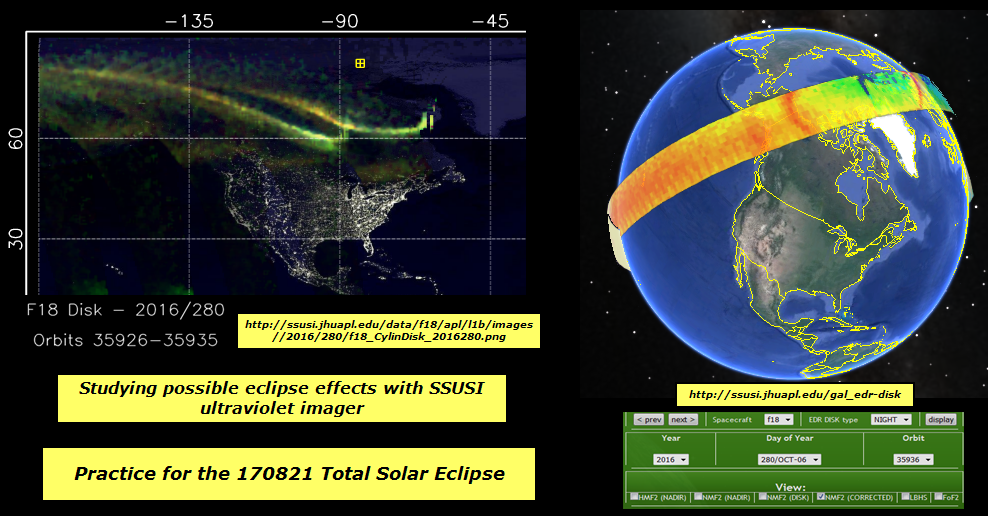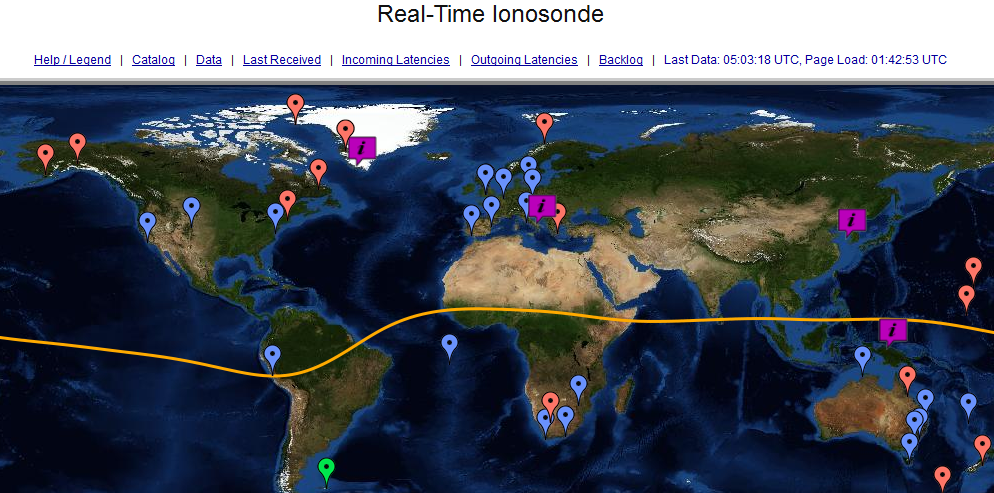Eclipse 170821 preparatory links:
http://herrero-victor.blogspot.com/2016/08/links-to-pages-about-2017-total-solar.html
Links to Ionosonde stations:
At USA National Geophysical Data Center NGDC :
http://ngdc.noaa.gov/ionosonde/real_time/
Latest:
http://www.ngdc.noaa.gov/stp/IONO/rt-iono/latest/latest.html
Description of Ionograms:
Computation of ionospheric electron density from the black line plasma resonance frequency in ionograms
Approximately:
NumberElectronsPerCubicCentimeter =
1.24E4 * PlasmaResonanceFrequencyInMHz^2
Example, at 10 MHz , 1.2E6 electrons per cubic centimeter
At 4 MHz , about 1.9E5 electrons per cc
Typical electron densities
Eclipse 170821 preparations - Study of Wallops Island Virginia WI937 VIPIR Ionograms
Example below from:
http://ngdc.noaa.gov/ionosonde/data/WI937/individual/2016/290/image/WI937_2016290183500.GIF
Contacts:
Ryan Hamel 978-934-4900 <ionosonde@noaa.gov>
Dr. Terry Bullett <Terry.Bullett@noaa.gov>
https://www.google.com/search?q=vipir+ionosonde links to VIPIR
https://en.wikipedia.org/wiki/Wallops_Island describes NASA Wallops Island Flight Facility
Mirrion Ionosonde Data:
http://www.ngdc.noaa.gov/stp/IONO/rt-iono/
------------------------------
Eclipse 170821 preparations - Solar Eclipse Balloon launch from Carbondale Illinois, with Student participation
http://eclipse.siu.edu/lsu-researchers-students-plan-solar-eclipse-balloon-launch-siu/
"...At
90,000 feet, the video camera will be able to see some 200 miles out
toward the horizon. Guzik said it may be possible to see the moon’s
shadow coming toward Carbondale at a distance, though the group will
have little or no control over which way the camera is pointed at any
given time..."
More Preparation for Eclipse 170821 :
http://herrero-victor.blogspot.com/2016/10/preparation-for-eclipse-170821.html
NASA Eclipse Resources
From NASA's Education Message for May 11 :
"....On Aug. 21, 2017,
the United States will experience a solar eclipse! This celestial event
will provide a golden opportunity to engage and educate diverse
audiences, and NASA has the resources to help.
Along a path 60 to
70 miles wide stretching from Oregon to South Carolina, observers will
be able to see a total solar eclipse. Others across North America will
see a partial eclipse. The event will happen around lunch time across
the country. For an interactive map with timing information along the
path of the eclipse, visit
http://eclipse.gsfc.nasa.gov/SEgoogle/SEgoogle2001/SE2017Aug21Tgoogle.html.
Visit the following websites to find additional information and resources, including:
-- Tips for safely viewing the solar eclipse.
-- Recorded interviews with NASA scientists, mission specialists and eclipse path communities.
-- Topical online eclipse videos, featuring a variety of STEM and cultural topics.
-- Social media community development and networking.
-- Mobile educational eclipse applications.
-- Public challenges and engagement activities.
-- 2-D and 3-D printing exercises for K-16 students.
-- Citizen science campaigns in partnership with NASA mission observations.
-- Adjunct activities and educational resources.
-- Live streaming of observations and programming.
Total Eclipse 2017 -- Through the Eyes of NASA
http://eclipse2017.nasa.gov
Eclipses and Transits
http://www.nasa.gov/eclipse
Watch "The Solar Eclipse 2017 PREVIEW Show" with NASA EDGE.
https://youtu.be/UPPGxqqZug0 ..."
Many thanks to NASA Education Messages.
---------------------------
...













